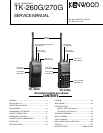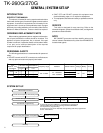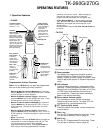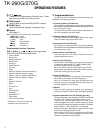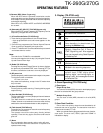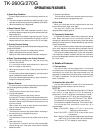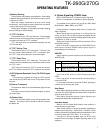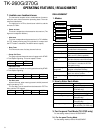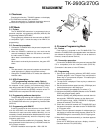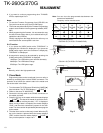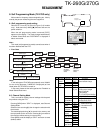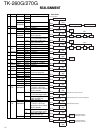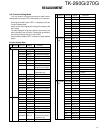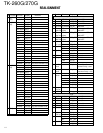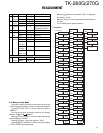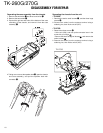
TK-260G/270G
7
OPERATING FEATURES
4) Battery Warning
This transceiver has a battery warning feature. If low voltage
is detected during transmission, the transceiver warns you by
a flashing red "LED".
When the voltage is detected to be even lower during
transmission, the transceiver stops transmission and warns
you by a flashing red "LED" and a beep.
Please notice "indication" for the battery exchange, charging
time by flashing red LED and beep.
5) "TOT" Pre-Alert
The transceiver has a "TOT" pre-alert timer. This parameter
selects the time at which the transceiver generates a "TOT"
pre-alert tone before the "TOT" is expired.
"TOT" will expire when the selected time passes from the
TOT pre-alert tone.
6) "TOT" Re-Key Time
The transceiver has a "TOT" re-key timer. This timer is the
time you cannot transmit after the "TOT" is exceeded. After
the "TOT" re-key time expires you can transmit again.
7) "TOT" Reset Time
The transceiver has a "TOT" reset timer. This timer is the
minimum wait time allowed during a transmission that will reset
the "TOT" count.
"TOT" reset time causes the "TOT" to continue even after
the PTT is released, unless the "TOT" reset timer has expired.
8) OST (Operator Selectable Tone) (TK-270G K types
only)
The transceiver is capable of having the "OST" function
and 16 tone pairs (QT/DQT) with a max 10-digit name for each
tone pair.
9) Clear to Transpond
The transceiver waits for an acknowledment signal until the
channel free.
This feature ensures the acknowledment signal is receive
by another party.
10) Battery Save
This is the automatic battery saver during standby mode
operation. The receiver circuit is turned on and off to conserve
the battery life.
6. Option Signalling (DTMF/2 tone)
Built-in DTMF decoder is available for option signalling.
Built-in 2-Tone decoder is available for option signalling.
It is possible to use individual call, group call, DBD (Dead
Beat Disable). Note : DBD is only DTMF
Preset operation is triggered when there is a match with
Option Signaling.
When Option Signaling matches on a Group Channel
where it is set to Yes, the Option Signaling display flashes
and Option Signaling is canceled. Settings after this will cause
"Transpond" or "Alert" to sound.
Setting the Selective Call Alert LED will cause the LED to
start flashing orange.
Mute or Unmute is triggered by the ID/QT/DQT/Carrier
when option signaling matches (when Option Signal is
deactivated by a transmission).
AND/OR
Option Signaling match conditions can be selected with
AND/OR logic.
Alert/Transpond AF Mute Open
AND
Triggers at match with QT/ Triggers at match with QT/
DQT/ID+DTMF(2tone);Opt
DQT/ID+DTMF(2tone);
Opt
OR
Triggers at match with QT Triggers only for match with
/DQT/ID+DTMF
(2tone) ; Opt QT/DQT/ID;Signaling
Even if set as OR, there is no Alert/Transpond just with
DTMF.
Even if set as OR, AF mute cannot be canceled just by a
match with DTMF.
In conventional channels not set with QT/DQT, signaling is
a match just by receiving the carrier.
Auto Reset
When Option Signaling matches on a Group channel where
it is set to Yes, Option Signaling is canceled when it matches a
group channel set to Yes.
After Option Signaling matches, Option Signaling can
automatically Reset after a specified time.
Dead Beat Disable
When the D.B.D (Dead Beat Disable) code matches, a
preset operation is performed.
When D.B.D matches on all group channels regardless of
whether Option Signaling = Yes/No, then TX Inhibit or TX RX
Inhibit is activated by the settings performed afterwards. D.B.D
is canceled when the D.B.D. code + "#" is received.
Transpond is always activated when the D.B.D code
matches. Alert is not output. An Option Signaling match is not
displayed.



